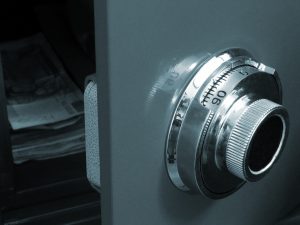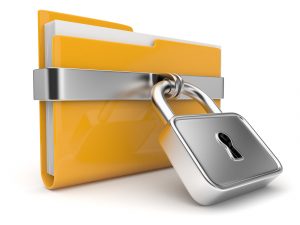We’ve seen it all too often lately. A natural weather disaster strikes leaving a path of destruction and misery in its path. In the midst of the shock and chaos, people are left scrambling trying to retrieve belongings and find the paperwork needed to help start the rebuilding and recovery process.
It’s a frightening scenario. And, while we can’t always predict where, when and to whom the next storm or calamity may strike, there are some things we can do to prepare in advance.
You have most likely heard the recommendation to have an “emergency kit” ready in the event of a major storm approaching. Generally, this kit includes flashlights, batteries, water, non-perishable food, prescriptions, and a first aid kit, among its necessities.
However, it also essential to keep tabs on your important personal documents such as:
- estate planning documents and other legal papers
- insurance, beneficiary, and tax information
- passwords, account numbers or other pertinent contact information
- medical records
These are crucial pieces of information that must be accessible both quickly and easily, especially in the wake of a natural disaster that could damage or destroy your home and property, or sadly, even cause injury or loss of life.
Where can estate planning documents be safely stored?
When considering the best place to store your estate planning documents like your Will, power of attorney, or healthcare directives, consider both:
(1) safety of the storage mechanism; and
(2) ease of accessibility in the event of an emergency.
You want to make certain that your vital documents can be accessed by appropriate and trusted people, especially if needed immediately.
Consider these four storage options for original estate planning documents:
 1. A fire-proof and flood-proof safe located in the home. An in-home safe is relatively inexpensive to purchase and is much more secure that simply using a file cabinet at your residence. The safe should be difficult to move (consider even having it bolted to the floor!), be placed in a private area of your house, and have a combination lock or key. Keep in mind that you should share the safe combination and location with a trusted person(s) in the event that you are incapacitated and access is needed to the safe’s contents.
1. A fire-proof and flood-proof safe located in the home. An in-home safe is relatively inexpensive to purchase and is much more secure that simply using a file cabinet at your residence. The safe should be difficult to move (consider even having it bolted to the floor!), be placed in a private area of your house, and have a combination lock or key. Keep in mind that you should share the safe combination and location with a trusted person(s) in the event that you are incapacitated and access is needed to the safe’s contents.
2. Safe-deposit box at a bank. These fire-proof metal boxes can be rented from a bank and offer another way to keep your personal documents safe. While a very secure option for storage, a safe-deposit box’s contents can be difficult to access, especially if needed immediately, if you were to become incapacitated, or are not local to the bank where the box is.
Generally, access to your safe-deposit box can be restricted by the bank (even if someone else has the key) to only yourself, a co-renter and/or perhaps to someone who you have granted as your agent. Access to documents in your safe-deposit box could also be complicated as box’s contents would likely be frozen at the time of your death. This means that your family – if you haven’t named another person on the box – might have to go through probate court to obtain access.
3. Online storage. You can store digital versions of your documents on a hard-drive, thumb drive or an online cloud storage system such as idrive, DocuBank, Microsoft OneDrive, or Dropbox. Online cloud storage allows your documents to be easily organized and also accessible with a login and password, from any computer at any time – a great benefit if documents are needed immediately. However, one thing to keep in mind is that some medical and financial institutions, and some states, may not accept electronic copies of estate planning documents, so it’s still a good idea to have your original hard-copy, paper-signed documents stored in a safe place as well.
4. With your attorney. Some estate planning law firms offer clients the option to have original estate planning documents stored at a secure location in the firm. (Typically, Czepiga Daly Pope & Perri offers clients storage for their Will.) This is a way to prevent misplacing original signed documents, avoid it falling into unwanted hands that may have access to your home, and makes the documents accessible to your attorneys if they will also be handling estate administration or other legal matters for you and your family. However, if you choose this method, do keep up with any ownership or location changes within the firm, as that may directly affect where your documents end up being stored.
Whichever method of document storage you choose, just be sure that a member(s) of your trusted circle is aware that he/she has been granted access to your estate planning documents, and knows where to find them and how they can be retrieved. The safety and security of where and how you store your documents are only as good as how you have organized and communicated who has access.
If you are unsure of how to best organize and store your documents, you can also reach out to your trusted financial and legal professionals, such as your estate planning attorney for assistance in making sure all of your estate planning documents are properly completed and in a secure place.
You’ve already done the hardest part – getting all your documents completed – so there is no time like the present to take the next simple step and get the stored them safely.
Related Posts:
Does Your Last Will and Testament Include Your On-line Passwords?
5 Financial Resolutions You Can Keep
5 Ways to Prepare for the Death of a Spouse
Estate Plan Updates: Why They Matter and When to Make Them
Keep or Toss? Keeping Your Records Straight Pays Off
 Connecticut Estate Planning Attorneys Blog
Connecticut Estate Planning Attorneys Blog



